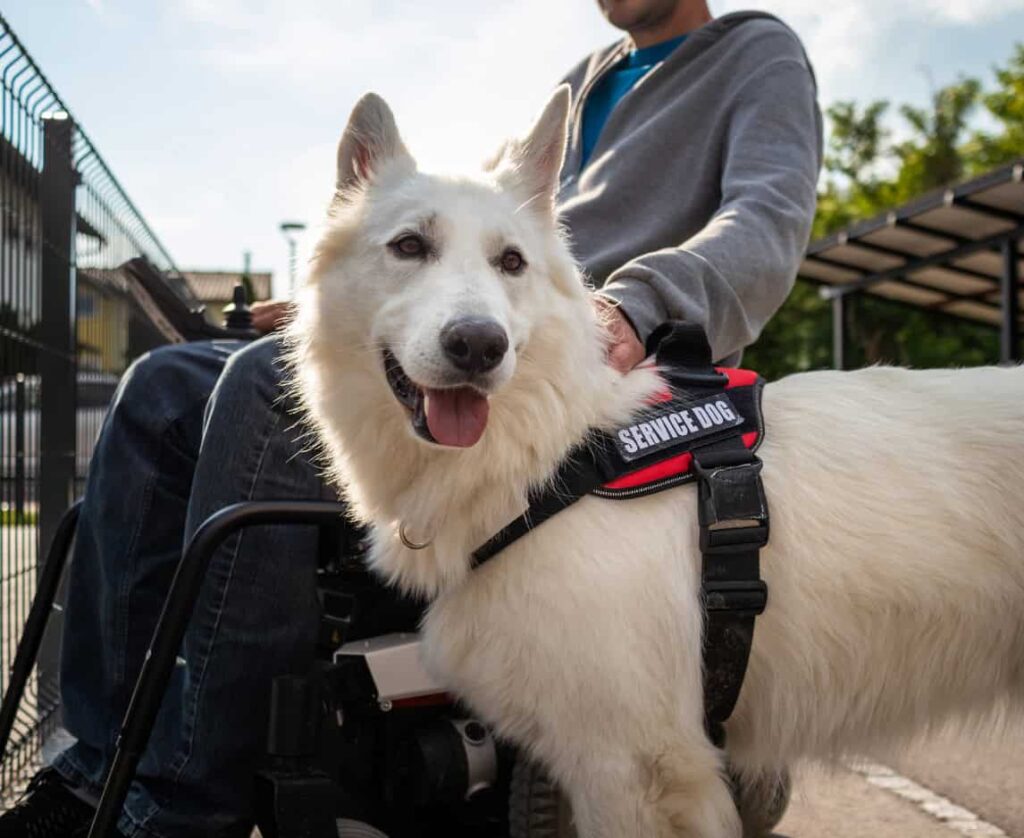While every canine provides a service to their human companion by providing unconditional love and immeasurable joy, this post will look more deeply at the topic and discuss the amazing field of Service Dogs. Whether it be the traditionally thought of guide dogs for the visually impaired, canines aiding those on the Autism spectrum, or Psychiatric Service Dogs; service dogs undergo extensive training to aid their human companions in living full lives and are legally differentiated from pets. So what are the various types of service dogs?
Types of Service Dogs
Guide - Perhaps the most widely recognized and seen service dog is the Guide Dog. Trained to help the visually impaired live independent lives, increasing function and productivity for handlers is always a priority for guide dogs. Guide dogs are the first recorded instance of canine assistance, with records indicating use in the first century A.D. while standardized training protocols began being implemented in the 1700s. Amazingly, guide dogs develop “selective disobedience”. This advanced trait allows guide dogs to independently assess situations for safety, while still remaining obedient.
Psychiatric Support - These amazing canine companions provide a comforting shield and calm in distressing times. Incredibly helpful to those living with severe depression/anxiety, bipolar disorder, and Post Traumatic Stress Disorder among other psychiatric diagnoses; Psychiatric Support Dogs differ from Emotional Support and Therapy Dogs. Although both can be very helpful to mental health, Emotional Support and Therapy Dogs are still pets, while Psychiatric Support Dogs undergo extensive training and fall under a different legal classification.
Mobility Assistance - Likely to be seen paired with a wheelchair user, Mobility Assistance Dogs help allow their humans to better move through the world. Performing tasks from pushing elevator buttons, pulling wheelchairs up steep ramps/hills, to being a source of balance, Mobility Assistance Dogs aid their humans to complete many tasks able-bodied individuals take for granted.
Seizure Alert - Many dog parents lovingly talk about their canine’s ability to sense when extra cuddles or kisses are needed on an emotionally stressful or somber day. Similarly, Seizure Alert Dog training results in sensitivity to the signs of an impending seizure. Capitalizing on a dog's ability to notice subtle changes in behavior, these talented canines can be a lifesaver to individuals with epilepsy for a seizing incident. While scientific understanding is lacking to explain the skills of these dogs, research clearly shows their innate seizure detection abilities.
Hearing - Just like vision, hearing is an ability that lets humans function in daily life. In fact, hearing not only allows communication, but can be a skill used to keep oneself safe. By alerting their humans to important sounds such as fire alarms, alarm clocks, door knocks/bells, or even a baby’s cries, hearing dogs offer hearing impaired handlers independence. While deafness can be incredibly isolating, hearing dogs offer a connection to the auditory world for those with impaired hearing.
Allergy Detection - Along with their loyal and loving personalities, one trait dogs are known for is their extremely perceptive sense of smell. Capitalizing on their strong olfactory function that is able to identify the presence of otherwise hidden allergens, an allergy-detecting canine can offer a child more independence. While Allergy Detection Dogs can give all aged humans more freedom, many parents find tremendous comfort knowing their child has the added protection of one of these skilled canines at school or a social function when the parent cannot attend.
Autism Support Dogs - Although Autism awareness has improved over the years, individuals on the Autism spectrum face challenges that most of us do not in many social situations and settings. Fortunately, Autism Support Dogs boost their humans’ ability to communicate, while also helping to regulate emotion. Most importantly with the growing prevalence of canines used in service to humans, Autism Support Dog handlers help to break down connection barriers without judgment.
Diabetic Alert Dogs - With a sense of smell found to be 10,000 to 100,000 times stronger than us bipeds, Diabetic Alert Dogs are able to detect scents that humans can't, such as chemical changes in their owner’s blood sugar. Thanks to this incredible ability, these dogs can alert others when a diabetic’s blood sugar drops too low or is higher than normal, providing an extra layer of security and a sense of independence.
FAQs
How Many Service Dogs Are in Use Nationally Today?
Despite the roughly 61 million Americans living with a disability, only 500,000 registered Service Dogs reside in the United States. The low number of Service Dogs is due to a combination of cost, availability, and barriers for service animals remaining today. While there are no breed restrictions for Service Animals, Retrievers tend to be the most commonly used due to their trainability, gentle natures, and intelligence.
How Can a Dog Become a Service Dog?
As with most things of value, training Service Dogs requires time and money. In fact, to properly train a service dog can take around 18 months and cost at least $25,000. Of course, the human will also need to be familiarized with their canine and learn how to maximize the benefit from the partnership. To maximize the chances of a successful match, some organizations like our RAWZ FUND partner, NEADS, incorporate the human into the training with living on campus for 5-10 days of intensive training on how to live and work with their canine!
The power a pet can have to aid in healing and moving forward in life is something that RAWZ truly appreciates and supports through our RAWZ Fund partners. Hopefully this look at the versatility of roles service dogs can play increases your understanding of these amazing dogs. If you would like to learn more about our minimally processed nutrition offerings to improve the health of your pet and join us in supporting our non-profit partners, visit our Authorized Retail Locator!





